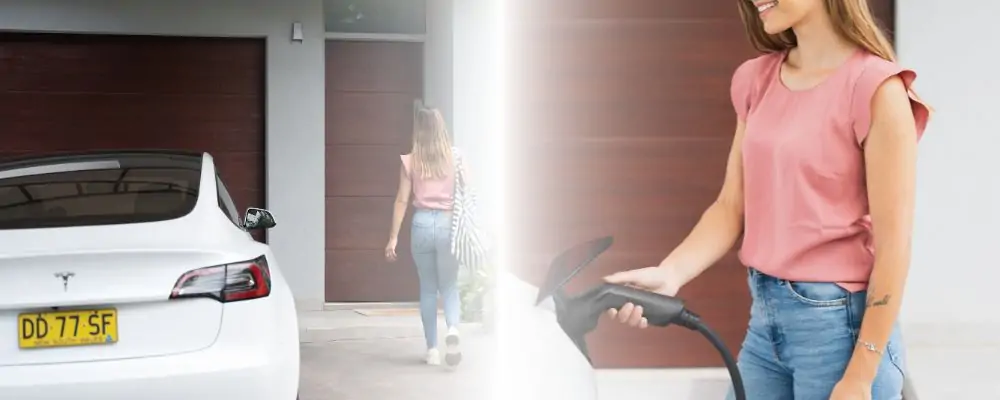EV charging at home – is your home EV ready?

EVs are rapidly becoming the new alternative to petrol and diesel vehicles, with car buyers opting for electric vehicles over the standard petrol car, in a move towards a more sustainable future. This increase in public charging stations is excellent in the move towards a more sustainable future, although nothing compares to the convenience of charging at home. So, our question to you is, is your home EV ready?
Before purchasing an EV there are many technicalities to consider, one being the preparation of your home for EV charging. Here are some important aspects to determine whether your home is EV-ready:
1. Access to Charging:
Before purchasing an EV, it is important to consider where in your home you will install the charger. Do you have an accessible garage in your home or a dedicated parking space within your apartment, where the charger could be installed? Do you require a clean and safe space; maybe you have kids and can’t have cables dragging on the floor, creating trip hazards. Before installing an EV charger, it may be worth considering what accessories will help improve your home. Ensuring your space is accessible is critical to ensure a seamless charging experience, allowing you to easily make your daily commutes or spontaneous trips. This eliminates the need for frequent trips to a local charging station, providing you will reliability and access to charging on your schedule. which can save you not only time but also money.
2. Electrical Capacity
An EV charger generally required a large volume of electricity but can vary depending on your choice and the speed / kW of the charger. Another important aspect to determine whether your home is EV-ready is electrical capacity. First, check with an electrician to see if your home’s electrical system can take on the additional load of an EV charger. This will involve assessing the capacity of your home’s electrical panel and determining if it can support your chosen charger without overloading the system. If necessary, your chosen electrician can make any necessary upgrades. Load management strategies may help reduce the pressure on your home’s electrical system. Smart charging strategies such as scheduling your charging during off-peak hours when electricity rates are lower, not only help reduce charging costs but also help to balance the load on your home’s electrical grid. Ocular’s IQ Home Solar is extremely effective in load management, which senses energy limitations in your home and adjusts the charging speed to avoid overloading your electrical supply.

3. Permitting and Regulations:
Before making an alteration within your home or building it is important to check with your or building it is important to check with your local council for any permits you may require before installing your EV charger. This will involve familiarising yourself with the permitting process. This process may entail submitting your plans, paying any necessary fees, and scheduling inspection with your local council to ensure compliance with your building’s codes and regulations.
4. Compatibility with your car:
Before progressing further, it is important to decide on a charger that is compatible with your EV. Although most cars are compatible with all of EVSE’s charging range, it is important to check whether your vehicle is compatible with Type 1 or Type 2 charging. Take a look at our most popular cable, the Type 2 to Type 2 EV Charging Cable.
5. Choosing your preferred charger:
Chargers will come with many different features called smart features. It is important to assess whether you want your charger to have all or some of these features before purchasing. These features may include Wi-Fi connectivity, scheduled charging, solar charging, or remote monitoring. For example, the Ocular LTE, which has no smart features and requires the user to be within range when charging versus the Ocular LTE Plus which allows the user to schedule and monitor their charging remotely from their app. Depending on the capabilities of the charger and how many features it has will determine the price point of the charger. These features enhance the user experience often improving the convenience and accessibility of the charger.
6. Overall cost:
It is important to plan ahead to ensure you are cost-efficient and within your budget when deciding on the best EV charger for you. Before installation, it is important to evaluate the cost of the charger, the installation, the amount of energy that will be used when charging, as well as any improvements or upgrades you may need to make to your electrical system/switchboard. At EVSE we offer turnkey solutions, meaning we provide the software, hardware, and installation, allowing you to be at peace of mind knowing that we have it all covered. It may be possible to offset some of the cost of your new charger, as some utility companies offer incentives or rebates for EV installation. Check with your utility company if you are eligible before installing.
7. Future Expansion:
Before installation, you must first consider if you plan on expanding in the future. This may mean installing additional stations or upgrading your electrical panel. It is suggested to choose adaptable charging infrastructure to ensure compatibility with emerging standards, for example, faster charging protocols and vehicle-to-grid integration. By planning ahead you are able to ensure your EV charger remains efficient and adaptable to future changes and advancements in electric mobility.
By addressing these technical considerations, you can enjoy the convenience of at-home charging, while benefiting the environment. These recommendations will now ensure that your home is EV charger-ready now and in the future.
Have any questions? Contact us:
Phone: 0800 990 032
Email: sales@evse.nz


